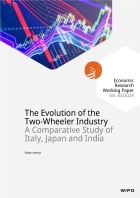The Evolution of the Two-Wheeler Industry: A Comparative Study of Italy, Japan, and India
Economic Research Working Paper No.83
Author: Paolo Aversa
Publication year: 2024
DOI: English

This study leverages secondary data to provide a comprehensive outlook on the origin and evolution of the two-wheeler industry in Italy, Japan, and India. The study reveals how different technological, design, and manufacturing capabilities, combined with specific economic and social features in the historical contexts, have contributed to determine different trajectories in the evolution of these national industries. Recent trends towards digital transformation, electric mobility, connected driving are discussed. Three main takeaways emerge from our analysis. Firstly, the local capabilities play a crucial role in shaping both the origin and progression of the technology and the industry. Secondly, the two-wheeler industry displays patterns and trajectories that mimic the automotive industry, which can thus be used to interpret and forecast past, present, and future of motorcycles. Thirdly, the two-wheeler industry has been uniquely influenced by other industries, which has enhanced the complexity and effectiveness of its products and introduced novel elements which are reshaping the international demand for two-wheelers.
